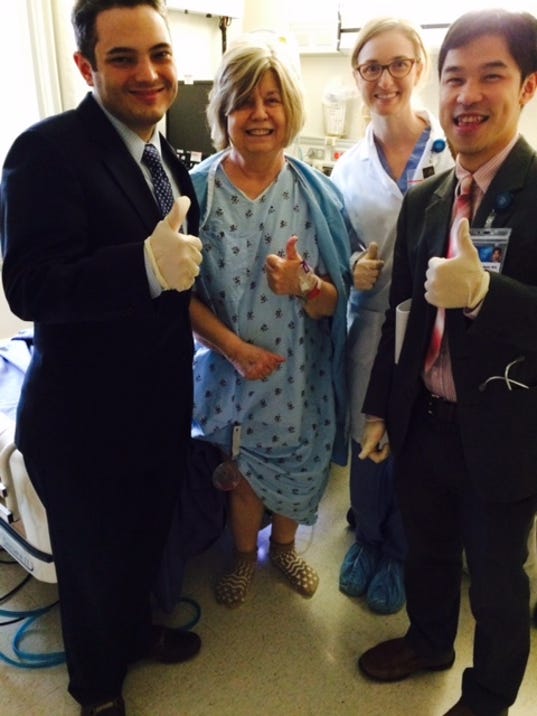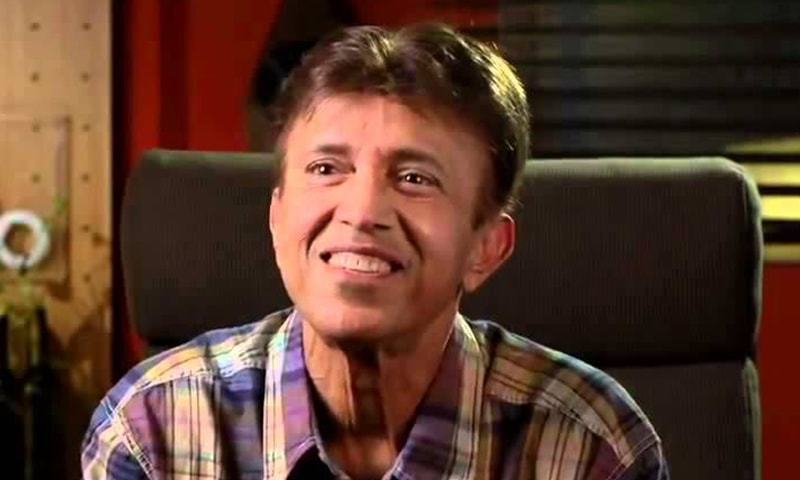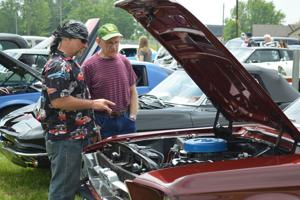The Herald News, New Lenox, IL, By DENISE M. BARAN–UNLAND
Lonchar, widowed at a young age when she had three small children, scrolled through the comments assuring the woman – Michelle Doyle – of prayers and well-wishes.
But Lonchar, who also had the rare Type O-negative blood Doyle had, thought she needed to do more.
“Her story resonated with me, and I could not stop thinking about this woman,” Lonchar said. “I don’t know why.”
On Sept. 30, Lonchar met Doyle. On Oct. 2, Lonchar donated one of her kidneys to Doyle and saved her life.
Virtual call for help
By January 2014, Doyle’s surgeon warned her she was a ticking time bomb. She no longer had any kidneys, and her doctor told her she needed to turn to social media to help find a live donor. She needed to stop worrying people might pity her.
So – reluctantly – Doyle did. She is humbled at Lonchar’s generosity and called her amazing.
“She’s like the sister I never knew,” Doyle said.
Looking back, Doyle said she knew her kidneys were in trouble, but she didn’t want to admit it. Her grandmother, Lorraine Steinquist, (deceased) had begun hemodialysis when she was 45 for polycystic kidney disease.
Doyle’s mother, Cheryl Doyle, also was 45 when she began dialysis. Fifteen years ago, Pam Vanderbilt of New Lenox, Cheryl’s neighbor, donated one of her kidneys to Cheryl. One of Doyle’s uncles also had a kidney transplant, also for polycystic kidney disease.
According to the National Institutes of Health, www.niddk.nih.gov, polycystic kidney disease is a genetic disease in which cysts form in the kidney and fill with fluid, causing the kidneys to enlarge and leading to possible kidney failure.
But when back pain began when Doyle was 24, she attributed it to working out. When her abdomen enlarged, Doyle blamed it on middle-age spread. Her nocturnal shortness of breath was from anxiety, she decided. But it was so bad that Doyle made a doctor’s appointment for blood work.
Emergency situation
On Oct. 6, 2011, Doyle was at the gym with her fiance, Mike Tomaska, when she received a phone call from her doctor. Get to the hospital now, the message said. You are in end-stage renal failure.
The blood work for Doyle’s kidneys was so bad, the doctor couldn’t believe the number, Doyle said. So Doyle – who is terrified of needles – and Tomaska went to the hospital. A permanent catheter was put into her chest, and dialysis was begun. [Read more]
From The Des Moines Register, by Deb McMahon

My family received a miracle at the Mayo Clinic! My dear sister Pam will not have to receive dialysis treatments due to polycystic kidney disease.
Pam received that life saving kidney just in the nick of time. Her kidney function had deteriorated to 12 percent, she had a constant headache, her back felt like it was on fire and she threw up every morning. Yet, she remained the eternal optimist, never complaining, asking "why me?", moaning or groaning. Just seeing her, one would not guess she was suffering from end stage renal disease.
The miracle happened at the Mayo Clinic under the able hands of Dr. Mikel Prieto and his assistants. Of course the miracle could only happen with a donor. Our angel donor changed my sister's life and there is no way we could ever repay her.
What do you say to someone who so selflessly made the decision and never wavered? She willingly "shared her spare" so my sister could have a chance at life unencumbered by dialysis.
She gave her the gift of life and feels as blessed by her decision as we feel by the miracle outcome. That is true grace.
I am still in awe of the gift given by our angel and by the speedy recovery of my sister. She is at The Gift of Life Transplant House in Rochester where she will stay for two weeks. With her positive attitude, her grateful heart and her treasured family and friends, she will continue to be a shining example of what a miracle looks like!
Being able to see a miracle as it played out at The Mayo Clinic was a gift. The bond formed with the angel donor and her angel husband, the sharing together when we heard good news, the applause when they were out of surgery and the group hugs with happy tears are memories I will not forget.
We are family now. We have shared an experience that was life changing. It is true that there are angels among us and our angel just saved my sister's life!
From Daily Telegraph, St. Marys, Australia, ALISON BALDING

St Marys Senior Constable Tony Mascherin recently received a new kidney from a colleague. Pictures: Matthew Sullivan
Senior Constable Tony Mascherin will live to dance at his children’s weddings because a kind-hearted colleague gave him a kidney.
The St Marys police officer hopes sharing his story will encourage more people to register as organ donors after Detective Senior Constable Tony Blair donated a kidney.
“It saved my life,” Sen-Constable Mascherin said. “I’ll see my children grow up and get married, and have a better quality of life.”
YOU’RE NEVER TOO OLD TO DONATE
HUNDREDS OF PATIENTS MISSING OUT ON ORGAN DONATIONS

The father of four was diagnosed with polycystic kidney disease in 2007.
By 2011 his kidney function was below 8 per cent and he was put on dialysis for up to six hours a day.
When word started to spread through St Marys police station, Detective Sen-Constable Blair felt compelled to step forward.
He did not want recognition for the selfless act but spoke to The Standard to encourage others to become organ donors. “He needed a kidney and I had one spare,” Sen-Constable Blair said. “I know it’s an innocuous statement but it’s the truth. Anyone would do the same, I just happened to get in first.”
His advice to others considering becoming donors was “just do it”. The pair have the same first name, have been police officers for eight years and each has four children but, until this generous gesture, they were not particularly close.
Less than three months after the operation, Sen-Constable Mascherin said he was still trying to work out a way to say thank you.
“I still can’t believe someone could be that nice, he saved my life,” he said. “That is just who Tony is, a very kind-hearted person.”
St Marys crime manager Detective Inspector Barry Vincent praised the “selfless act”. “I hold him in the highest regard,” he said.
Living with PKD
From Dawn, Pakistan, by MEHREEN HASAN
The St Marys police officer hopes sharing his story will encourage more people to register as organ donors after Detective Senior Constable Tony Blair donated a kidney.
“It saved my life,” Sen-Constable Mascherin said. “I’ll see my children grow up and get married, and have a better quality of life.”
YOU’RE NEVER TOO OLD TO DONATE
HUNDREDS OF PATIENTS MISSING OUT ON ORGAN DONATIONS
The father of four was diagnosed with polycystic kidney disease in 2007.
By 2011 his kidney function was below 8 per cent and he was put on dialysis for up to six hours a day.
When word started to spread through St Marys police station, Detective Sen-Constable Blair felt compelled to step forward.
He did not want recognition for the selfless act but spoke to The Standard to encourage others to become organ donors. “He needed a kidney and I had one spare,” Sen-Constable Blair said. “I know it’s an innocuous statement but it’s the truth. Anyone would do the same, I just happened to get in first.”
His advice to others considering becoming donors was “just do it”. The pair have the same first name, have been police officers for eight years and each has four children but, until this generous gesture, they were not particularly close.
Less than three months after the operation, Sen-Constable Mascherin said he was still trying to work out a way to say thank you.
“I still can’t believe someone could be that nice, he saved my life,” he said. “That is just who Tony is, a very kind-hearted person.”
St Marys crime manager Detective Inspector Barry Vincent praised the “selfless act”. “I hold him in the highest regard,” he said.
Living with PKD
From Dawn, Pakistan, by MEHREEN HASAN

Veteran singer Alamgir has been battling polycystic kidney disease for years and is ready to take the next step towards relief from the pain he has long suffered.
Alamgir is about to leave for Atlanta, where his kidneys will be removed as a preliminary procedure for his kidney transplant next year.
Also read: Alamgir: Ailing pop star sings at media event
The surgery is expected to take place in mid-June at Atlanta's Emory Hospital, which is "one of the best in America," said Alamgir to Dawn.com.
"Once I arrive, I'll undergo lots of tests, so my doctors are sure that I'll be able to tolerate the long surgery," he added.
Typically, a third kidney can be fitted in without the removal of the existing kidneys, but Alamgir's are so enlarged that there is no room for the third, he said. He added to Dawn.com that he finds it hard to breathe due to this reason.
It will take Alamgir five to six months to heal after the surgery, after which he will return to Pakistan to wait out the interval before his transplant.
Responding to a question about his treatment funding, Alamgir said that the government hasn't fully made good on its promise to donate for his kidney transplant. "They had promised me 50 lakhs, but I only got 20. It's been three years since 2012 (when I received the first donation) and there has been no follow-up. I managed to raise the remaining money through my own hard work."
Dialysis Developments
From The Wall Street Journal, By TIMOTHY HAY

The hundreds of thousands of patients in the U.S. who get kidney dialysis face multiple appointments at the clinic each week, where they hook up to big, bulky machines for hours at a time.
The technology involved, which essentially does the work for kidneys that are malfunctioning, hasn’t been significantly upgraded in decades.
One startup medical-technology company, San Jose, Calif.-based Outset Medical Inc., aims to make the experience easier on patients, and eventually turn dialysis into something that can be done in the home.
The company is making a small, lightweight system that can do the same work that today is done by machines that take up most of a room, Chief Executive Leslie Trigg said.
Outset Medical is in the midst of raising a large Series B round to get its system into dialysis clinics, and begin the process of moving the technology into patients’ homes, Ms. Trigg said.
The company has thus far closed on $45 million in new equity investment plus $15 million from converted warrants in a Series B round that is expected to grow significantly larger in the near future, she said.
The funding was provided by return investors Warburg Pincus and Vertical Group, as well as new public-equity investors whose names the company isn’t disclosing. The second phase of funding, which is expected to close soon, will also involve new and returning investors, Ms. Trigg said.Among Outset Medical’s innovation is the miniaturization of the water-filtration component, a breakthrough that could lead to the first consumer version of dialysis with a device small enough to be kept in the home. [Read more]
The technology involved, which essentially does the work for kidneys that are malfunctioning, hasn’t been significantly upgraded in decades.
One startup medical-technology company, San Jose, Calif.-based Outset Medical Inc., aims to make the experience easier on patients, and eventually turn dialysis into something that can be done in the home.
The company is making a small, lightweight system that can do the same work that today is done by machines that take up most of a room, Chief Executive Leslie Trigg said.
Outset Medical is in the midst of raising a large Series B round to get its system into dialysis clinics, and begin the process of moving the technology into patients’ homes, Ms. Trigg said.
The company has thus far closed on $45 million in new equity investment plus $15 million from converted warrants in a Series B round that is expected to grow significantly larger in the near future, she said.
The funding was provided by return investors Warburg Pincus and Vertical Group, as well as new public-equity investors whose names the company isn’t disclosing. The second phase of funding, which is expected to close soon, will also involve new and returning investors, Ms. Trigg said.Among Outset Medical’s innovation is the miniaturization of the water-filtration component, a breakthrough that could lead to the first consumer version of dialysis with a device small enough to be kept in the home. [Read more]
PKD Fundraising
From News-Dispatch, Michigan City, By MATT CHRISTY

La PORTE — The annual Cruisin' for a Cure for PKD, which was held at the La Porte County Fairgrounds on Sunday, brought classic car enthusiasts and owners together to help raise money for the genetic kidney disorder.
Organized by Laura Moyer, who suffers from polycystic kidney disease and comes from a family where 15 members share the disease, the event consisted of a car show followed by a 40-mile cruise. All money raised went toward PKD research.
All makes and models of vehicles were welcomed as the event kept focus on the cause. More than 50 cars participated in the event, from 1931 Ford Model A's to brand new Ford Mustangs. Prizes also were given away, as well as trophies to three judge's choice winners.
La Porte County Sheriff John Boyd served as guest judge for the car show and led the cruise afterward.
"I'm honored because it's such a great event," Boyd said. "It's nice to see the community come out for something positive where they rally behind a cause that's so beneficial for people."
PKD is one of the most common life-threatening genetic diseases and affects 1 in 500 Americans. The disease causes cysts to form on both kidneys, eventually resulting in the organs shutting down and requiring those suffering from PKD to need organ transplants and anti-rejection medicine.
Moyer, who serves as chair of the Northern Indiana Chapter of the PKD Foundation, said in attendance were organ donor recipients who totaled more than 27 years of life with their new organs. Moyer is one of those, as she received a kidney thanks to her husband's donation three years ago.
"Everybody is awesome," Moyer said of the turnout for the event. "Even the people that come through and maybe just want to go look at the old cars and like to do that are willing to give a donation because they know it's to a great cause."
The money raised will continue to go to research and clinical trials for cures to PKD, as well as research to help organ donor recipients keep their new organs inside of them.
"It's important and not only just about kidney disease, but also about organ donation," Moyer said. "We're trying to teach both here about how important organ donation is. Unfortunately there are lots of people dying everyday because there isn't donations. We're trying to teach both."
For more information about PKD and the Northern Indiana Chapter of the PKD Foundation, as well as upcoming events, visit www.pkdcure.org.
No comments:
Post a Comment